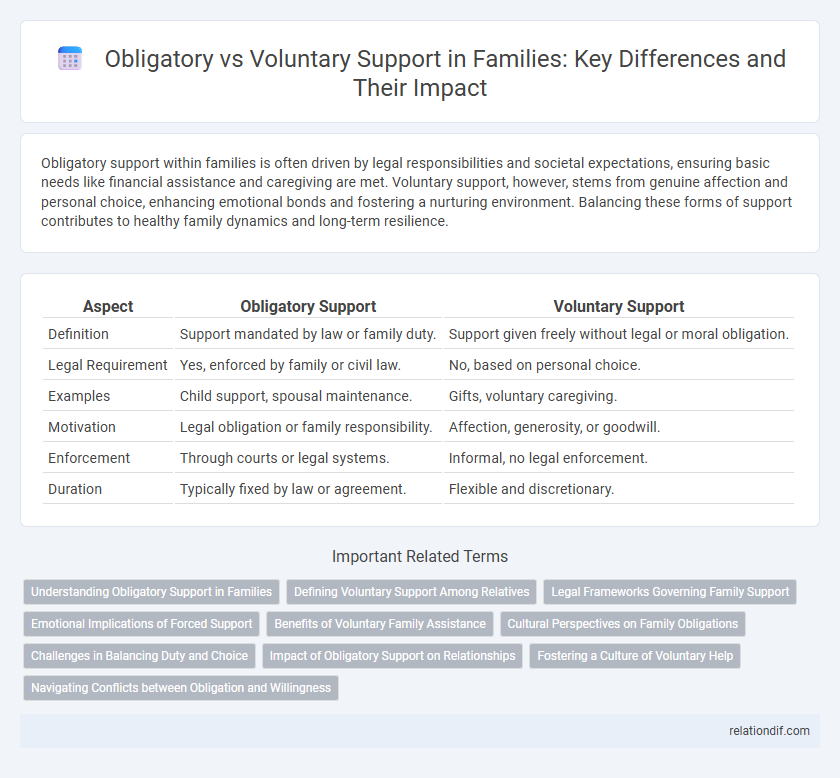Obligatory support within families is often driven by legal responsibilities and societal expectations, ensuring basic needs like financial assistance and caregiving are met. Voluntary support, however, stems from genuine affection and personal choice, enhancing emotional bonds and fostering a nurturing environment. Balancing these forms of support contributes to healthy family dynamics and long-term resilience.
Table of Comparison
| Aspect | Obligatory Support | Voluntary Support |
|---|---|---|
| Definition | Support mandated by law or family duty. | Support given freely without legal or moral obligation. |
| Legal Requirement | Yes, enforced by family or civil law. | No, based on personal choice. |
| Examples | Child support, spousal maintenance. | Gifts, voluntary caregiving. |
| Motivation | Legal obligation or family responsibility. | Affection, generosity, or goodwill. |
| Enforcement | Through courts or legal systems. | Informal, no legal enforcement. |
| Duration | Typically fixed by law or agreement. | Flexible and discretionary. |
Understanding Obligatory Support in Families
Obligatory support in families refers to legally or morally mandated assistance, often defined by family law statutes and cultural expectations that require members to provide financial, emotional, or caregiving aid. This form of support ensures basic needs are met, such as child support, spousal maintenance, or elder care, establishing clear responsibilities between relatives. Understanding obligatory support is essential for recognizing the legal and ethical boundaries that differentiate it from voluntary support, which is given out of goodwill without formal obligations.
Defining Voluntary Support Among Relatives
Voluntary support among relatives refers to non-mandated assistance provided by family members based on personal choice rather than legal obligation. This type of support often includes emotional encouragement, financial help, or caregiving without court enforcement or formal agreements. Unlike obligatory support, voluntary contributions rely on mutual trust and familial bonds to address needs within the family network.
Legal Frameworks Governing Family Support
Legal frameworks governing family support distinguish between obligatory support, mandated by statutes such as child support and spousal maintenance laws, and voluntary support, which encompasses informal financial or emotional assistance provided without legal compulsion. Obligatory support is enforceable through court orders based on family law statutes that prioritize the welfare of dependents and ensure fair distribution of resources. Voluntary support, while not legally mandated, plays a significant role in family dynamics and is often encouraged within legal guidelines that recognize the importance of maintaining family relationships.
Emotional Implications of Forced Support
Obligatory support in family relationships often generates emotional strain, leading to feelings of resentment and diminished trust when individuals feel compelled to offer assistance. Voluntary support, by contrast, fosters genuine connections and mutual respect, enhancing emotional well-being and relationship satisfaction. The emotional implications of forced support highlight the importance of autonomy and willingness in maintaining healthy family dynamics.
Benefits of Voluntary Family Assistance
Voluntary family assistance fosters stronger emotional bonds by promoting empathy and mutual respect among members, enhancing overall family cohesion. It encourages a supportive environment where help is given freely, reducing stress and conflict compared to obligatory support. This type of assistance often leads to increased satisfaction and resilience within families, contributing to long-term well-being.
Cultural Perspectives on Family Obligations
Cultural perspectives on family obligations significantly influence whether support is viewed as obligatory or voluntary, often reflecting deeply rooted values and social norms within a community. In collectivist cultures, family support tends to be considered a mandatory responsibility, with adult children expected to care for aging parents and relatives as a moral duty, reinforced by social expectations and traditional practices. Contrastingly, individualistic societies emphasize personal choice and autonomy, where family assistance is more likely to be voluntary and negotiated based on personal circumstances rather than societal pressure.
Challenges in Balancing Duty and Choice
Balancing obligatory support and voluntary support within families often presents challenges as individuals navigate legal and moral responsibilities against personal willingness and emotional readiness. Obligatory support is mandated by law or social norms, such as child support or elder care, which can create stress when resources or commitment are limited. Voluntary support relies on personal choice and goodwill, which may fluctuate based on relationship dynamics, leading to potential conflicts or feelings of resentment when expectations are misaligned.
Impact of Obligatory Support on Relationships
Obligatory support often creates a sense of duty that may strain family relationships, as recipients might feel pressured or dependent rather than genuinely cared for. This dynamic can lead to misunderstandings and resentment when support is given out of obligation rather than affection. Voluntary support, by contrast, tends to strengthen bonds through mutual respect and willingness, fostering healthier and more positive family interactions.
Fostering a Culture of Voluntary Help
Obligatory support is often mandated by law or social norms, requiring family members to provide financial or emotional assistance. Voluntary support, however, emerges from genuine care and willingness, fostering stronger bonds and mutual trust within the family. Encouraging a culture of voluntary help enhances family cohesion and promotes resilience through shared responsibility and empathy.
Navigating Conflicts between Obligation and Willingness
Balancing obligatory support and voluntary support within families often leads to conflicts arising from unmet expectations and perceived fairness. Understanding individual motivations, communication styles, and cultural norms plays a crucial role in resolving tensions between duty and genuine willingness. Effective conflict navigation requires empathy and clear boundaries to foster mutual respect while accommodating personal capacities and emotional needs.
Obligatory support vs Voluntary support Infographic

 relationdif.com
relationdif.com